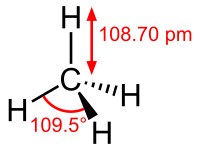
Photo from wikipedia
Abstract CH4 chlorination with Cl2 gas is used for the production of chlorinated products via C H bond activation in CH4. Due to the high reactivity of Cl2, this reaction… Click to show full abstract
Abstract CH4 chlorination with Cl2 gas is used for the production of chlorinated products via C H bond activation in CH4. Due to the high reactivity of Cl2, this reaction can occur spontaneously under UV irradiation or with mild thermal energy even in the absence of a catalyst via a free radical-mediated chain reaction mechanism that undesirably causes excessive chlorination of the CH4 and is thus non-selective. In this work, CH4 chlorination is investigated using HY and MFI zeolites with various Si/Al ratios, by which the reaction is catalytically controlled for selective production of the mono-chlorinated product (CH3Cl). Depending on the framework type, Si/Al ratio of the zeolites, and reaction conditions, different degrees of CH4 conversion, CH3Cl selectivity, and hence CH3Cl yield were achieved, by which systematic relationships between the catalyst properties and performance were discovered. A high aluminum content facilitated the production of CH3Cl with up to ∼20 % yield at a high gas hourly space velocity of 2400 cm3gcat−1 h−1 with a CH4/Cl2 ratio of 1 at 350 °C. HY zeolites generally furnished a slightly higher CH3Cl yield than MFI zeolites, which can be attributed to the larger micropores of the HY zeolites that support facile molecular diffusion. With various flow rates and ratios of CH4 and Cl2, the CH4 conversion and CH3Cl selectivity changed simultaneously, with a trade-off relationship. Unfortunately, all zeolite catalysts suffered from framework dealumination due to the HCl produced during the reaction, but it was less pronounced for the zeolites having a low aluminum content. The results shed light on the detailed roles of zeolites as solid-acid catalysts in enhancing CH3Cl production during electrophilic CH4 chlorination.
Journal Title: Catalysis Today
Year Published: 2020
Link to full text (if available)
Share on Social Media: Sign Up to like & get
recommendations!